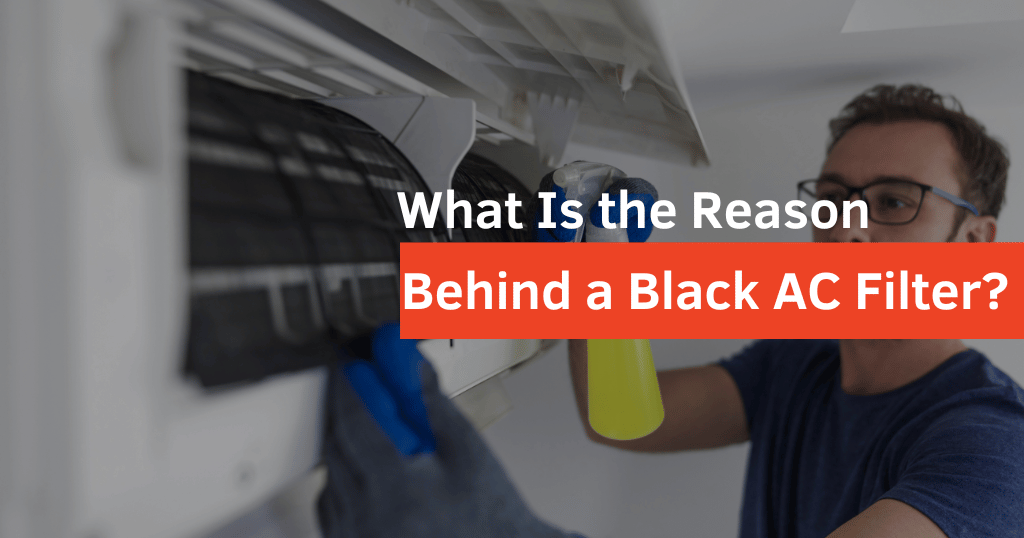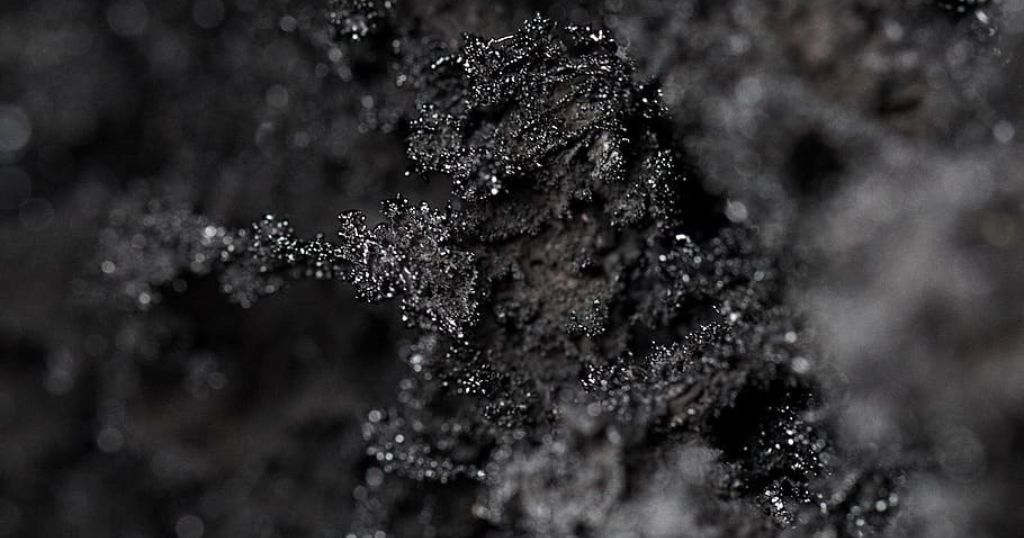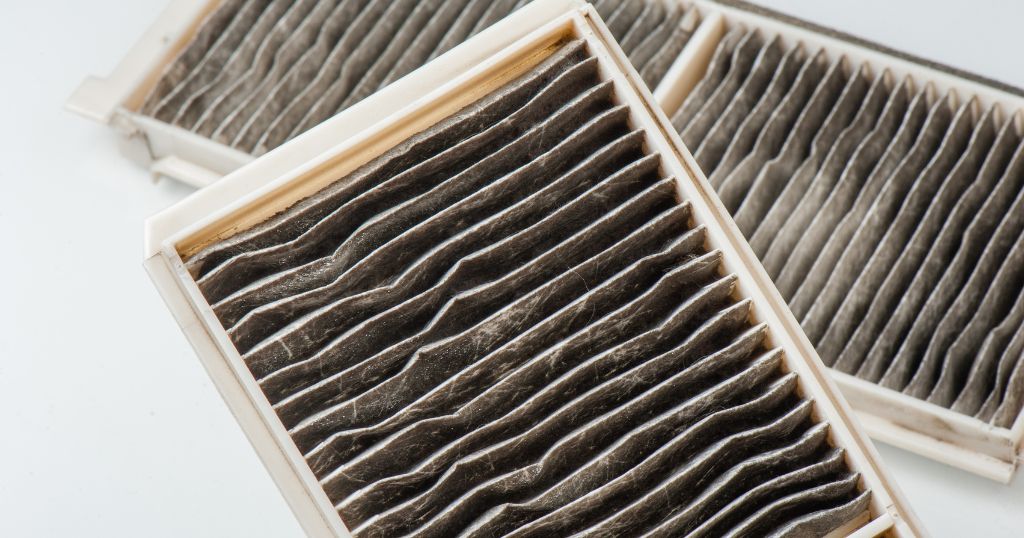All filters are made in the USA – Order Today

Have you ever looked at your home’s air filters and noticed they’ve turned black? Don’t panic! It’s common, so don’t worry about it. The reason behind this color change is often related to two main factors: soot and mold. Even though a black air filter might seem concerning, the good news is that it’s generally not harmful. In our exclusive article, we’ll discuss why your air filter can end up looking black, explaining it in simple terms. So, let’s dive deep into this exclusive blog without further ado!
If your air filter is black, it is because of soot. But it means that your air filters are working perfectly fine. Otherwise, the soot would have been in your lungs instead of the air filters. That’s also where we realize the importance of high-quality air filters in HVAC systems. What’s causing soot accumulation on your air filters? The answer is obvious – fire!
Now, you might be surprised that there is no source of fire around your house, so where did the soot come from? There are a few common sources of fire in houses that people forget are actually fire.
For instance, when you light the wick of a candle, the black smoke blows out of it, and it is all soot. Since its temperature is high, it rises and gets sucked in by your intake vent. The filters in your HVAC system show their magic and prevent them from entering your home, which leads to color discoloration. Do you know how you can prevent your air filters from turning black?
Just stop burning candles. Yes, you heard it right! But if that’s not possible and you are a fan of scented candles, you can reduce soot with these tips:
Another cause of a black air filter could be your gas fireplace. Do you have it in your house? Then, you have another thing to blame for causing your air filters to turn black. When in operation, your gas fireplace burns a dirty and yellow fire that creates a significant amount of soot, and then it rises and gets sucked up by your AC intake vent. If you don’t want your air filters to turn black, consider following the below-listed tips.
From here in this section, we also get to know that if you use a low-grade or old filter, they might not be able to prevent the entry of soot, resulting in various health and respiratory issues.

If the blackness in your air filter is wet and slimy, you can easily tell that it’s due to mold. And that’s a bigger problem than soot, but you don’t have to worry about anything if you check your HVAC air filters regularly. If it’s your first time finding mold on your air filters, it must not be older than three months, and you are safe from the long-term effects of mold exposure.
However, if it’s been a long time since you checked your air filters, you should be concerned about it. Those with symptoms like fatigue, shortness of breath, and headaches should consult their healthcare provider immediately. In order to grow, mold needs moisture, and if you can see mold on your air filters, there must be an issue with the condensation drainage in your air conditioner.
When the drainage pipe of your AC gets damaged or if your system has back pressure, the moisture gets transferred to the air filters. You cannot fix this problem without technical expertise and knowing how the HVAC system works. You should call an HVAC professional to get this problem fixed ASAP.
If you haven’t replaced your HVAC filters for a long time, too much debris must have accumulated on the air filters. In this case, you don’t have to worry about anything. However, you should change the filter in your HVAC system in no time. Also, establish an appropriate routine for changing your HVAC filters to ensure it never happens again.
Not changing the air filters at the right time can severely damage your HVAC system. There are a variety of factors that you need to consider in order to determine the right frequency for changing your HVAC filters, including system usage, environmental conditions, and many more. If you want to learn more about how often you should change the air filter on your HVAC system, give a read to this blog now!

If you don’t want your air filters to turn black, first of all, you should fix all the underlying issues. Then, you can follow our below-listed tips to prevent your HVAC filters from turning black:
If you don’t want your air filters to turn black, you should inspect your HVAC filters regularly. With regular inspections, which are typically done on a monthly basis, you can identify issues early and prevent soot accumulation and other contaminants.
Individuals with a fireplace in their house should keep it well-maintained to prevent their air filters from turning black. If your fireplace starts producing soot due to incomplete combustion, your air filter will turn black in no time. The maintenance of the fireplace includes chimney cleaning and proper ventilation.
Do you have a heating system in your home that uses fuel to operate? If yes, ensure you use high-quality fuel, as low-quality fuels can produce more soot, causing your air filters to turn black. Also, get a professional to inspect your heating unit for any issues that might contribute to increased soot production, including debris blocking the flue, lack of oxygen, etc.
To ensure your air filters don’t turn black, you should try to reduce indoor pollution. You should focus on minimizing activities that produce soot, like excessive cooking without proper ventilation or burning candles. All this will decrease the number of airborne particles, causing the air filter to turn black.
Get your HVAC inspected and cleaned by professional technicians to ensure it operates at its maximum efficiency and prevent issues like air filters turning black. You should get your HVAC system serviced by professional technicians at least once or twice a year.
The air filters of your HVAC system can turn black due to mold or soot accumulation. However, this issue can also manifest if you don’t maintain your HVAC system. If you don’t want this issue to occur, you should avoid activities that produce soot, and if the mold has blackened your air filters, get your system repaired immediately.
For air filters that have turned black due to a lack of maintenance, regular inspection and air filter replacement are necessary. If you think it’s the right time for filter replacement, visit Custom Filters Direct for high-quality HVAC filters. You can consult our air filter experts for assistance if you are struggling to find the right filter for your HVAC system.
Normally, an air filter doesn’t turn black. A dirty air filter is generally gray in color. However, if your air filter has turned black, there must be activities going around that cause much soot production.
There could be numerous reasons for your air filter to be so dirty. If you live in an area where ongoing construction work or flowers are blossoming around your house, your filters will be much dirtier compared to locations with different conditions. However, if there is no such activity taking place around your house, get your HVAC system checked for leakage issues.
As contaminants accumulate in your air filters, they turn them grey or brown. However, if your filter has turned completely black, you should get your technician to check for any leakages in your HVAC system.
You can tell if your HVAC filter needs replacement with a visual inspection. Check for dirt, dust, and debris on the filter surface. Also, if the airflow has decreased or your HVAC can’t maintain your desired temperature, get your air filters changed immediately.
Have any questions? We’re here and ready to help!
© 2022 Custom Filters Direct. All rights reserved.